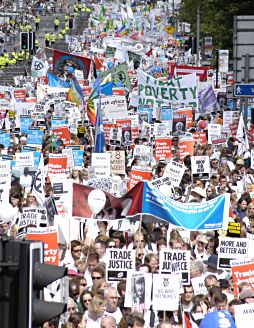Main content:
Human Rights and Gender Equality

This is the 2007 draft on human rights. You will get the newest version here.
Getting involved in order to improve conditions of life is made easier by rules and guarantees that are stipulated in universal, civic, political, economic, social, and cultural human rights. This kind of empowerment can strengthen activities, too. Gender equality, rooted in human rights, has a special role. On the one hand there is an existential discrimination of women regarding many global challenges. On the other hand women's daily activities contribute to relieve many global problems. Gender is a key to many of these challenges.
Targets/goals: On international level human rights are stipulated in the Universal Declaration of Human Rights, the International Covenant on Civil and Political Rights, and the International Covenant on Economic, Social and Cultural Rights, The Millennium Declaration includes the goal to end discrimination against women and the target to end, by 2015, disparities between boys and girls in all levels of education ( 2000, §§ 20.1, 25.4, 19.2).
Trend: ? no summarizing data on human rights available. Regarding the Millennium Targets on gender equality there is some progress. 18% of the boys and 22% of the girls in less developed countries are not enrolled in primary school. Additionally, the share of women in labour markets is monitored, as well as their share in parliaments – which has increased from 13% to 17% globally. (UN 2000, §§ 19.2, 20.1, 24, 25; UN 2007, 13.)
Sources
- UN 2000 – United Nations, General Assembly: United Nations Millennium Declaration.


- UN 2007 – United Nations: The Millennium Development Goals Report 2007.

 [Published by the United Nations Department of Economic and Social Affairs DESA – June 2007.]
[Published by the United Nations Department of Economic and Social Affairs DESA – June 2007.]
Draft (2007)
Photo credit: © Make Poverty History Assembly/Comic Relief
